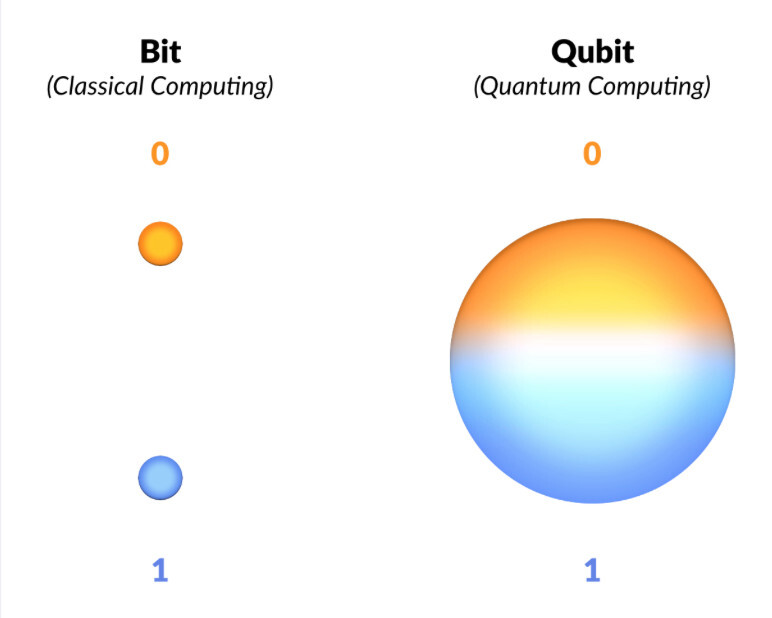What is a quantum computer and what can it do?
Quantum computers are pushing the boundaries as to the capabilities of a computer, allowing for exponentially faster and more efficient calculations as opposed to the ‘classical’ computer.
A few years ago, the quantum computer was still in the ‘academic’ realm, with the notion that it was still being studied and developed, and that is was not yet ready for real world uses.
Recently, it has begun to shift towards the commercial realm, with companies such as LG, BMW and Johnson & Johnson all expressing their interest in the new technology.
In this article, I’ll discuss how the revolutionary computer works and its promising opportunities to be used in many different fields.
First of all, before we get into anything, let’s understand how the quantum computer is able to achieve what it does…
How does the quantum computer work?
A quantum computer harnesses some of the most mystical properties of quantum mechanics. A regular computer uses ‘bits’, the famous 1s and 0s, to represent data. On the other hand, a quantum computer uses ‘qubits’, which are sub-atomic particles like photons and electrons.

What’s so special about qubits is that through ‘superposition’, they can represent numerous 1s and 0s at the same time. This fascinating phenomena allows the quantum computer to crunch through data more efficiently and at quicker speeds.
One problem that quantum computing faces though is something called ‘decoherence’. A qubit must be in the perfect environment for superposition to work. The slightest bit of vibration or change in temperature can cause the qubit to lose its superposition before it’s done its job.
Right now, that is what many of the vendors are looking to solve with their qubit solutions”
said Heather West on ZDNet, a senior research analyst at IDC
What are some possible uses of the quantum computer?
The quantum computer is unlikely going to be used by the average consumer, because they can already get most of what they want using classical computers.
Where quantum computers are extremely useful and outdo classical computers is in a category of calculations called ‘combinatorics’. Combinatorics involves finding the best possible solution out of an arrangement of items.
Classical computers struggle in this field due to the vast immensity in outcomes that it can present. Just imagine, when the number of items increases, the number of different arrangements increases exponentially.
Regular computers would have to iterate through every different arrangement and find the best outcome. Quantum computers are much faster in this department using qubits that I mentioned earlier.
Let’s take a look at some real-world examples of how a quantum computer can be used:
Chemical and biological engineering
Chemical and biological engineering entails the manipulation and discovery of molecules. Molecules can become very complex and can involve many different configurations. Quantum computers can discover different configurations and then predict the properties of the different molecules.
This means that it can assist in developing new materials and drugs.
Artificial intelligence
This is another area where quantum computing is very promising.
Artificial intelligence involves taking in data and recognising patterns in order to make the optimal decision. Quantum computing would be a huge boost in AI as it allows for the processing of larger amounts of data in shorter periods of time, increasing AI’s capabilities.
From these examples you can understand the potential that quantum computing has. It’s also been used for weather forecasts, to create better batteries and also for financial modeling.
When will quantum computing truly arrive?
All of this sounds promising but quantum computing still hasn’t really had an impact.
Lately though, many companies have started to put their trust and money into quantum computing.
Peter Lehnert, who leads BMW’s research group, said:
We at the BMW Group are convinced that future technologies such as quantum computing have the potential to make our products more desirable and sustainable”
The carmaker wants to use quantum computers to perform tasks such as discover the most optimal sensor placements for their cars.
Elsewhere, oil giant ExxonMobil have contracted with IBM’s quantum computers, while LG and Johnson & Johnson are among companies looking to work with Pasqal’s quantum computer.
These are all signs that a shift has occurred. Companies are now entrusting quantum computers. There is one problem that is leaving quantum computing in the ‘work-in-progress’ stage. That is decoherence, which leads to miscalculations and therefore unreliability.
But once that issue is put to bed, I believe quantum computers will truly arrive and could finally have a vast impact.
Bob Sorensen, analyst at Hyperion Research, believes that spending on quantum computers will grow by 22% to $597 million in 2022 and then an average of 26% a year until 2024. That is quite a steep rise.
- AI is the biggest technological breakthrough of the 21st century - January 19, 2022
- 3D printing is the future of the construction industry - January 14, 2022
- The top 5 tech that caught my eye in CES 2022 - January 10, 2022










